Dorje Shugden - Der Weisheitsbuddha-Beschützer der Tradition Je Tsongkhapas
Spirituelle Überlieferungslinie
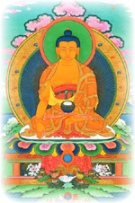
Buddha
Shakyamuni
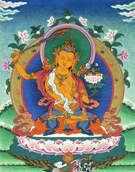
Buddha
Manjushri

Je Tsongkhapa
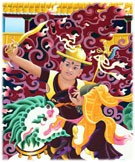 Wisdom Buddha
Wisdom Buddha
Dorje Shugden
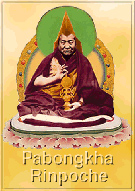
Pabongkha Rinpoche
(1878-1941)
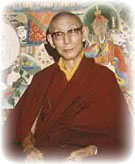
Trijang Rinpoche
(1901-1981)
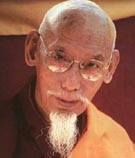
Song Rinpoche
(1904-1984)
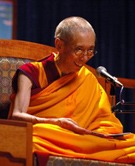
Geshe Kelsang Gyatso
(born 1931)
An Interview with Mrs Pema
Interview with Mrs Pema, Delhi 1997, where she explains about the stone-throwing and arson attacks on her house in Clementown, with children locked inside.
Mrs. Pema is the wife of the retired schoolteacher Dr. Thubten. He escaped from Tibet in 1959 and joined the teacher training program in Dharamsala. From 1963 he worked for the Indian government for 29 years in the Central Tibetan School system in Mussoorie, in South India, in Dalhousie and Shimla. In 1991 the family bought a small piece of land in the Clementown Tibetan settlement near Dehradun and built a house there. They have a daughter age twenty-two. Mrs. Pema says she was introduced to the Dorje Shugden practice by her husband but has become a strong believer herself now. She is crying as soon as she starts to talk and intermittently breaks into uncontrollable sobs. She is clearly still traumatized from the events which happened a year ago and again several months ago. I talked to Mrs. Pema's nephew, a monk at Ganden, independently at another time. He had been locked inside the house during the arson attempt and confirmed her story. I met Mrs. Pema unexpectedly in Delhi in October 1997; her husband was somewhere in Delhi in an undisclosed place, so I could not interview him.
Mrs. Pema: My husband knows much about Dorje Shugden because he is a Geshe Lharampa and earlier had studied the subject extensively. He explained the history to people who had not even heard about Dorje Shugden before and were told all kinds of misinformation. So after that people were saying he is not obeying the Dalai Lama. October last year (1996) we came to Delhi for religious observances and left our daughter and nephew in the house [in Clementown near Dehradun]. On November 7, 1996, a group of people came and locked the house from the outside with the children inside and then threw stones at it and tried to set the house on fire. Luckily only the curtains caught fire through the open windows, the house did not burn because it is made of concrete. The children were able to stop the fire from spreading inside but men with masks had poured kerosene over the front door before they ignited it. For two hours they pelted the house with stones and shouted obscenities, including references to Dorje Shugden in Amdo dialect. Kalsang, my daughter, was finally able to open the door from the inside with a hairpin. She called us in Delhi. When we went to talk to the police, they told us that they could not protect us and that we should leave for a while because our lives were in danger there. They assured us that the house would be under police protection. So we left for Delhi.
On June 29, 1997, our house in the Clementown settlement was attacked again. We got a call saying that if we wanted to save any of our possessions we better come back immediately. When we got there, we went to the police station for help. They accompanied us and left two policemen with us while we looked through the house to see what could be salvaged. We found the door had been broken down and everything was destroyed with broken china everywhere. Thirty years of hard work went into this house. Fifteen to twenty minutes after the other policemen had left, a group of seventy to ninety Tibetans came and bombarded the house with stones again for two hours. The two policemen left for our security ran away. After some time twenty to twenty-five different policemen, some with two or three stars, came from Dehradun. A journalist took pictures. The crowd took his camera and injured his hand. This is documented in a number of different articles in the local Hindi language press. See Part II, Nov. 8-9, 1996. Two or three women held back a policeman while the Tibetan men kept attacking the house. Leading officers finally told us to take our possessions and to leave since the crowd would kill us and they would not take any responsibility. I told them I did not want to leave the house. If I cannot have religious freedom, I will die for it.
We asked the police for a written statement saying that they could not protect us, but they refused. They only said that if we did not leave, the mob would kill us. Then a policeman came with a truck and took us away for protection. We were kept in police custody for five hours. A friend and the driver who had brought us from Delhi were hurt and did not receive medical attention. Then the local police brought our belongings, saying that we had to vacate the house. They did this as a favor to us since the mob was threatening to burn down everything. Since most of the things were broken, like the TV and refrigerator, we told them they are of no use anymore, that they should have left them to burn.
Q: Why did you not initiate legal action?
A: We don't know anything about Indian law and if we try to complain or file a case, there is a bribery system. We don't have any money. A complaint will take a long time. Besides, the Clementown police were bribed by Tibetans. The truck the police had loaded our things on and sent us away from the settlement was paid for by the police with money they received from the government in exile. They have made our life like hell.
Now we live in Delhi where we have to pay rent. We lost everything and my husband is too old to start over again. The people in Clementown want to kill him. Only because of the religious ban did we have trouble there, after we had lived there peacefully for five years. My daughter did not sign the petitions to give up Dorje Shugden. There were ten to fifteen families in Clementown who relied on Dorje Shugden. We were the only one that did not sign the petition. My husband was a disciple of Kyabje Trijang Rinpoche and had strong faith in him. So there was no question of giving his signature. My husband taught Tibetan children for thirty years. Many of them now hold office in Dharamsala and they turned against him like this. Everywhere he went he used to get respect from former students -- thousands and thousands. Now everything is destroyed, is finished. We are refugees a second time, once from Tibet and once from India.
Politischer Führer
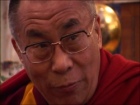 Dalai Lama
Dalai Lama
Die Heuchelei
Verfolgen Sie die Geschichte der dreißigjährigen politischen Kampagne des Dalai Lama, eine jahrhunderalte spirituelle Tradition zu zerstören, die ihm von seinem eigenen spirituellen Meister gelehrt wurde, und ebenso die Bemühungen derjenigen, die durch ihn verletzt werden, ihn zu stoppen:
Kurze Zusammenfassung
- Was geschieht hier?
- Detaillierte Berichte über Diskriminierungen aus Indien
Die Position des Dalai Lama
- Lobpreisung des Weisheit-Buddhas Dorje Shugden durch den Dalai Lama
- In den Worten des Dalai Lamas
Warum geschieht es?
- Warum findet diese religiöse Unterdrückung statt?
- Sind die Gründe des Dalai Lama gültig?
Bemühungen, religiöse Freiheit wiederherzustellen
- Geshe Kelsangs Offener Brief
- Das Verbot ist rechtswidrig und verfassungswidrig
- Presseberichte und Videos
- Dalai Lama für Unterdrückung der Religionsfreiheit angeklagt
- Ein Konflikt mit einer Lösung
Analyse der Situation
- Geshe Kelsangs Stellungnahme zu Sektierertum
- Kann der Dalai Lama jemals einen Fehler machen?
- Ist der Dalai Lama der einzige spirituelle Führer im tibetischen Buddhismus?
- Theokratie oder Demokratie?
- Geisterverehrung oder authentische buddhistische Praxis?
- Freiheit der Religionsausübung
- Die Rechtfertigungen des Dalai Lama
- Was würde Thomas Jefferson über den 14. Dalai Lama denken?
Beweismaterial und Berichte aus erster Hand
- Chronologischer Hintergrund
- Dokumentation über Zwist im Exil
- Politische Motivationen für das Verbot
- Zusammenfassung bis heute von Exil-Tibetern
Anhaltende Verfolgung 2008
- Jüngste Stöckchen-Abstimmung und Ruf nach Hilfe
- Erzwungene Unterschriften und Identitätsausweis-Kampagne
- Verfolgung von Mönchen an den Sera-Klöstern
- Öffentliche Erniedrigung und Ausschluss von Mönchen
- Brief an den indischen Premierminister bezüglich Rechtsverstöße
- Brief von Dorje Shugden-Anhängern
- Dringender Apell von den Sera-Klöstern
- Unterstützung durch die indische Polizei
- Brief der Western Shugden Society an die Sera-Klöster
- Von Herzen kommende Bitte von Mönchen in Mundgod
- Weitere Diskriminierungen auf der ganzen Welt geplant
Verwandte Seiten
1. Western Shugden Society (deutsch)
2. Wisdom Buddha Dorje Shugden Blog (englisch)
4. DharmaProtector.org (englisch)